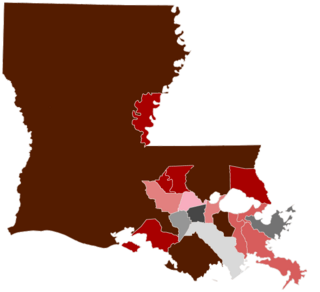
The 1904 Louisiana gubernatorial election was held on April 19, 1904. Like most Southern states between Reconstruction and the civil rights era, Louisiana's Republican Party had virtually no electoral support. As Louisiana had not yet adopted party primaries, this meant that the Democratic Party convention nomination vote was the real contest over who would be governor. The election resulted in the election of Democrat Newton C. Blanchard as governor of Louisiana.

The 1900 Louisiana gubernatorial election was held on April 17, 1900. This was the first state election after the adoption of Louisiana's 1898 constitution, which disenfranchised nearly all of the state's Black voters, who had been the core supporters of the Republican Party. The constitution had been prompted by the unusually strong voter support for Republicans and Populists in the 1896 Louisiana gubernatorial election.

The 1816 Louisiana gubernatorial election was the second gubernatorial election to take place after Louisiana achieved statehood. Under Article III Sec 2 of the 1812 Constitution of the State of Louisiana the Governor was elected in two steps. On the first Monday in July, eligible voters went to the polls and voted. The returns were sent to the President of the Louisiana State Senate. On the second day of the session of the Louisiana State Legislature, the Louisiana House of Representatives and Senate met in joint session and voted between the top two candidates. The candidate who received a majority in General Assembly became governor.

The 1820 Louisiana gubernatorial election was the third gubernatorial election to take place after Louisiana achieved statehood. Under Article III Sec 2 of the 1812 Constitution of the State of Louisiana the Governor was elected in two steps. On the first Monday in July, eligible voters went to the polls and voted. The returns were sent to the President of the Louisiana State Senate. On the second day of the session of the Louisiana State Legislature, the Louisiana House of Representatives and Senate met in joint session and voted between the top two candidates. The candidate who received a majority in General Assembly became governor.

The 1824 Louisiana gubernatorial election was the fourth gubernatorial election to take place after Louisiana achieved statehood. Under Article III Sec 2 of the 1812 Constitution of the State of Louisiana the Governor was elected in two steps. On the first Monday in July, eligible voters went to the polls and voted. The returns were sent to the President of the Louisiana State Senate. On the second day of the session of the Louisiana State Legislature, the Louisiana House of Representatives and Senate met in joint session and voted between the top two candidates. The candidate who received a majority in General Assembly became governor.

The 1828 Louisiana gubernatorial election was the fifth gubernatorial election to take place after Louisiana achieved statehood. Under Article III Sec 2 of the 1812 Constitution of the State of Louisiana the Governor was elected in two steps. On the first Monday in July, eligible voters went to the polls and voted. The returns were sent to the President of the Louisiana State Senate. On the second day of the session of the Louisiana State Legislature, the Louisiana House of Representatives and Senate met in joint session and voted between the top two candidates. The candidate who received a majority in General Assembly became governor.

The 1830 Louisiana gubernatorial special election was the sixth gubernatorial election to take place after Louisiana achieved statehood. Under Article III Sec 2 of the 1812 Constitution of the State of Louisiana the Governor was elected in two steps. On the first Monday in July, eligible voters went to the polls and voted. The returns were sent to the President of the Louisiana State Senate. On the second day of the session of the Louisiana State Legislature, the Louisiana House of Representatives and Senate met in joint session and voted between the top two candidates. The candidate who received a majority in General Assembly became governor. This particular election was called after the death of Governor Pierre Derbigny

The 1834 Louisiana gubernatorial election was the seventh gubernatorial election to take place after Louisiana achieved statehood. Under Article III Sec 2 of the 1812 Constitution of the State of Louisiana the Governor was elected in two steps. On the first Monday in July, eligible voters went to the polls and voted. The returns were sent to the President of the Louisiana State Senate. On the second day of the session of the Louisiana State Legislature, the Louisiana House of Representatives and Senate met in joint session and voted between the top two candidates. The candidate who received a majority in General Assembly became governor.

The 1838 Louisiana gubernatorial election was the eighth gubernatorial election to take place after Louisiana achieved statehood. Under Article III Sec 2 of the 1812 Constitution of the State of Louisiana the Governor was elected in two steps. On the first Monday in July, eligible voters went to the polls and voted. The returns were sent to the President of the Louisiana State Senate. On the second day of the session of the Louisiana State Legislature, the Louisiana House of Representatives and Senate met in joint session and voted between the top two candidates. The candidate who received a majority in General Assembly became governor.

The 1842 Louisiana gubernatorial election was the ninth gubernatorial election to take place after Louisiana achieved statehood. Under Article III Sec 2 of the 1812 Constitution of the State of Louisiana the Governor was elected in two steps. On the first Monday in July, eligible voters went to the polls and voted. The returns were sent to the President of the Louisiana State Senate. On the second day of the session of the Louisiana State Legislature, the Louisiana House of Representatives and Senate met in joint session and voted between the top two candidates. The candidate who received a majority in General Assembly became governor. This was the last election held under the Constitution of 1812, the next election was held under the Constitution of 1845.

The 1846 Louisiana gubernatorial election was the first of two elections to take place under the Louisiana Constitution of 1845. The new constitution abolished the provision in the 1812 constitution that required a gubernatorial candidate to win a vote of the legislature to get elected, leaving the final decision up to the people. The new constitution also cut incumbent Governor Alexandre Mouton's term short by one year thus moving the election from July 1846 to January 1846 with the inauguration of the new governor in February.

The 1849 Louisiana gubernatorial election was the last of two elections to take place under the Louisiana Constitution of 1845. The new constitution abolished the provision in the 1812 constitution that required a gubernatorial candidate to win a vote of the legislature to get elected, leaving the final decision up to the people. The new constitution also cut incumbent Governor Alexandre Mouton's term short by one year thus moving the election from July 1846 to January 1846 with the inauguration of the new governor in February.

The 1855 Louisiana gubernatorial election was the second election to take place under the Louisiana Constitution of 1852. As a result of this election Robert C. Wickliffe became Governor of Louisiana.

The 1864 Louisiana gubernatorial (Union) election was the first election to take place under the Louisiana Constitution of 1864. As a result of this election Michael Hahn became Governor of Union-controlled Louisiana.

The 1865 Louisiana gubernatorial election was the second election to take place under the Louisiana Constitution of 1864. As a result of this election James Madison Wells was re-elected Governor of Louisiana. The result was a lopsided victory for Wells because many whites, who supported the Democratic Party, remained disqualified due to their support of the Confederacy. Nonetheless Democrats nominated fugitive former Governor Henry Watkins Allen.

The 1872 Louisiana gubernatorial election was the second election to take place under the Louisiana Constitution of 1868. As a result of this election William Pitt Kellogg was elected Governor of Louisiana, but not before federal troops stepped in to enforce his election. The results of this election were highly contentious and resulted in racial violence across the state, including the Colfax massacre. U. S. President Ulysses S. Grant had to step in and formally recognize Kellogg as Governor to resolve the violence. Kellogg's Democratic opponent John McEnery finally conceded the election in September 1874 after briefly overthrowing Kellogg's government.

The 1876 Louisiana gubernatorial election was the third and final election to take place under the Louisiana Constitution of 1868. As a result of this election Francis T. Nicholls became Governor of Louisiana, but not before the election was contested by his opponent. The results of this election, like those of 1872, were disputed. The dispute was resolved by the Compromise of 1877 which gave the Governor's Mansion to Democrat Francis T. Nicholls. The Compromise also gave Republican presidential candidate Rutherford B. Hayes the electoral votes of several disputed states, including Louisiana, which resulted in his election to the White House. The election of Nicholls marked the end of Reconstruction in Louisiana and the decline of the Republican Party of Louisiana.

The 1879 Louisiana gubernatorial election was the first election to take place under the Louisiana Constitution of 1879. As a result of this election Louis A. Wiltz became Governor of Louisiana. The election saw widespread intimidation of African-Americans which guaranteed the election of the Democratic nominee.

The 1884 Louisiana gubernatorial election was the second election to take place under the Louisiana Constitution of 1879. As a result of this election Samuel D. McEnery was re-elected Governor of Louisiana. The election saw widespread intimidation of African-Americans which guaranteed the election of the Democratic nominee.

The 1888 Louisiana gubernatorial election was the second election to take place under the Louisiana Constitution of 1879. As a result of this election Francis T. Nicholls was re-elected Governor of Louisiana. The election saw widespread intimidation of African-Americans which guaranteed the election of the Democratic nominee.








